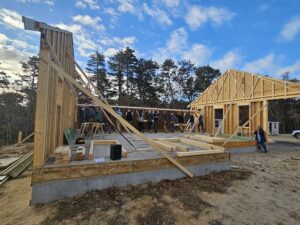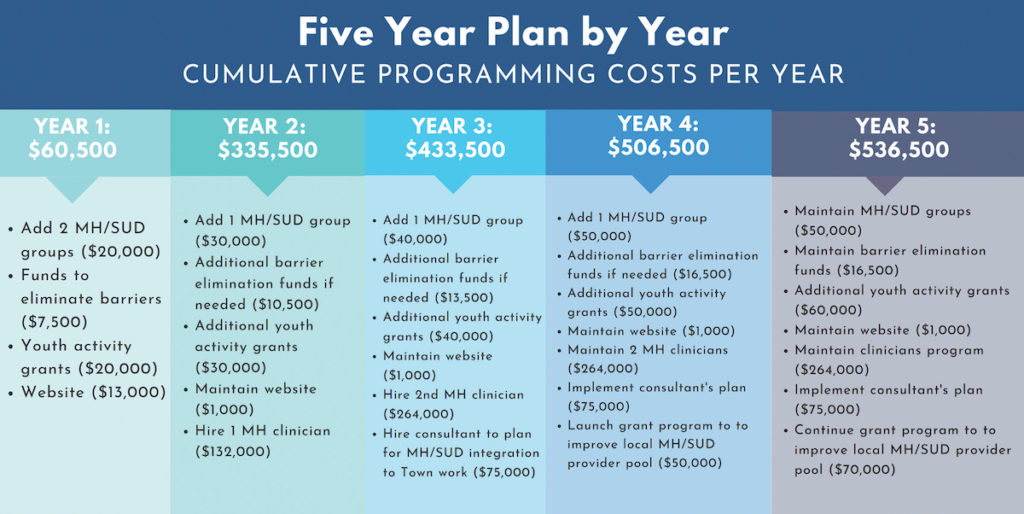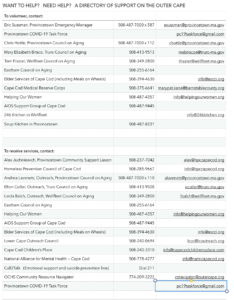WELLFLEET — Nash Badams learned to ride a bike in the summer of 2012. He was four years old, living with his recently divorced mother in a tent at Maurice’s Campground in Wellfleet.

It wasn’t until years later that he understood the gravity of his family’s housing situation, he said after the Nov. 2 wall-raising ceremony for the Habitat for Humanity house where he and his mother, Bridget, will live starting late next year.
Their new home — a 1,200-square-foot ranch on Old King’s Highway in Wellfleet — is one of four permanently affordable houses whose construction kicked off on Saturday. For the next year, the four families who were selected for the project will each contribute at least 250 hours of labor to the construction as part of Habitat for Humanity’s “sweat equity” requirement for future homeowners.
The winning families were selected by lottery after completing a 22-page application and a rigorous interview process. To target the most at-risk residents, Habitat requires that applicants make under 80 percent of Barnstable County’s area median income, which is $81,050 for a two-person household. Two of the four households make below 60 percent, which is $60,810 for two people.
Because the federal rules for area median income were written more than 50 years ago, when two-income households were less common, it can be hard for two-earner households to qualify for Habitat homes. Bridget Badams, who grew up in Wellfleet and works as an intake coordinator for the Homeless Prevention Council of Cape Cod, said that three of the four lottery winners this year are single parents.
Badams is the first point of contact for many people who call the Homeless Prevention Council for help. “I’m on the front lines of the Lower Cape’s housing crisis,” she said.
Badams said the event that tips many longtime residents into housing instability is the day their landlord sells the house or gives it to family members, leading to the displacement of tenants who may have lived there for decades.
That’s exactly what happened to Lisa Davis, a lifelong Cape Cod resident who had to leave her year-round rental in 2021 when her landlord gave the house to his daughter as a wedding present. Davis, who is in her 60s, spent the next three years moving between rented rooms and a tent in Shawme-Crowell State Forest in Sandwich.
Davis was also there on Saturday to help raise the walls on her new home.

“As much as I enjoy camping, I do not enjoy camping for survival,” Davis said. “I don’t recommend camping for survival for anyone at all.”
Davis said it’s easy to tell which campers in the state forest are homeless. “Anyone who is there this time of year is there because that’s what they have to do for shelter,” she said.
When she drove by the state forest last week, she said, she saw at least 15 tents.
Davis also works for a nonprofit: Child & Family Services of Hyannis, where she helps patients ages 4 to 21 as a therapeutic mentor. She’s held the job for the past five years, including while living in her tent.
“A lot of advice I was getting was ‘Move off the Cape,’ ” Davis said. “But I’ve been here my whole life. I don’t want to go.”
Melissa Silver, another of the winning Habitat homeowners, is a single mother of her six-month-old daughter, Charlotte. She grew up in Sandwich and works as a therapist at the Duffy Health Center in Barnstable, where she said at least half of her clients are either homeless or at risk of losing their housing. She said it’s hard not to feel a little guilty about her new home, but she’s excited to raise her daughter in Wellfleet with its nature trails.

“I kept praying that something would come around,” Silver said. “It’s hard for me to find words about how wonderful this experience has been. Faith guided me here.”
The fourth new homeowner is Courtney Lawless, who grew up in Orleans but said she has always dreamed of living in Wellfleet.
Lawless owns Nauset Massage in Orleans and also works weekends at the Ocean Edge resort in Brewster. She will share the house with her two children: Arlo, 19, who studies psychology at UMass Amherst, and Hattie, 12, who attends the Provincetown IB Schools.
“It’s the town I would picture myself in if I could choose to be anywhere,” said Lawless. “I’m excited to finally put my roots down.”
Construction is expected to take up to a year, but that is practically a sprint compared to the marathon process that came before it. Wellfleet’s housing authority acquired the land on Old King’s Highway in 2013, but it became the subject of a decade-long legal dispute that delayed the permits for Habitat for Humanity’s project until 2023.
Now that the walls are up, the project seems to have advanced a hundredfold in just a few hours.
“The first day of building really set in the excitement for us,” Badams said. “We haven’t had a dishwasher in 13 years.”

















